

22.09.2025
988
What is it about? Artificial rain in Dubai has become commonplace over the past decades. In the United Arab Emirates, cloud seeding has been regularly practised since the 1990s as part of a national drought management programme. The amount of artificially induced precipitation increases each year.
What methods are used? Currently, the country is experimenting with various technologies, including drones that shoot electrical charges at clouds. However, the most popular method is dispersing reagents from aircraft.
Specific conditions are required for water vapour to transform into raindrops. It's similar to water freezing: the physical process of changing the substance's state begins around a condensation nucleus or crystallisation centre.
This is why a body of water freezes from its shores towards its centre. In this case, the shores, as well as protruding rocks, sticks, and ripples in shallow water become crystallisation centres.
The processes in a cloud follow the same principle. Certain layers contain water droplets with negative temperatures that remain unfrozen. Strong wind, dust rising from the ground, or, for example, a lightning discharge can become crystallisation centres for them. The drops transform into small ice particles that continue growing until they fall to the ground under their own weight.
 Image source: TRR / shutterstock.com
Image source: TRR / shutterstock.com
Whether these drops reach the ground as snow or rain depends on the surface temperature. When upward air currents are particularly strong, the ice particles are held in the cloud longer and fall in more substantial sizes as hail of varying intensity.
Meteorologists have learned to “control the weather” by inducing artificial rain through enhancing clouds' ability to generate precipitation. Typically, it is used to meet rainfall needs for a specific region.
Cloud seeding might seem like something from science fiction, but as early as 1947, Vincent Schaefer induced the first artificial rain using dry carbon dioxide.
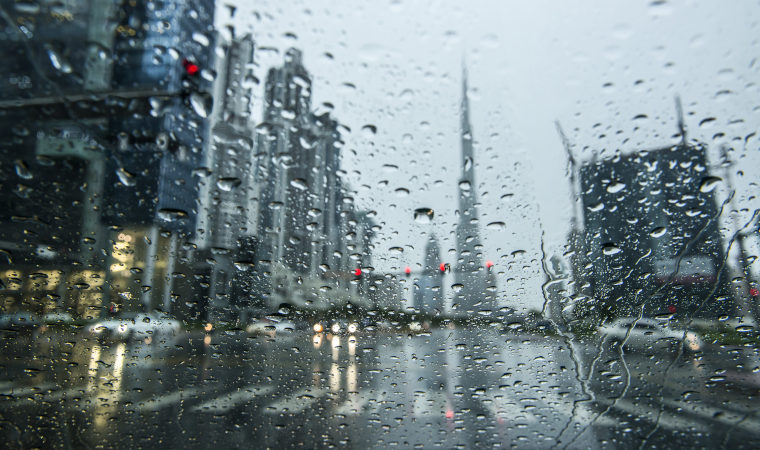 Image source: Naufal MQ / shutterstock.com
Image source: Naufal MQ / shutterstock.com
Indeed, artificial rain in Dubai is no longer a rarity today. In summer 2023, the United Arab Emirates meteorological service introduced new technology that made this phenomenon possible. There is an opinion that it will help transform vast sand expanses into lush flowering valleys.
The UAE authorities have taken a thorough approach to addressing climate change in desert areas. Dubai was among the first Middle Eastern states to create artificial rain. More than 180 cloud seedings were conducted here in the past year alone.
The country's meteorological services possess the best modern technologies and radars for monitoring various atmospheric processes.
Artificial rain in Dubai is induced through three methods:
The most frequently used method of rain induction there involves releasing condensation nuclei from aircraft altitude. The National Centre of Meteorology (NCM) plans to increase precipitation by more than 15% using dense clouds moving over the Persian Gulf.
The condensation nuclei contain salts such as sodium chloride, magnesium, and potassium chloride. Aircraft fire at cumulus clouds, accelerating condensation and forming water drops sufficient for rain.
Clouds form due to the influence of two air masses — upper and lower. Salt rockets are directed into the upper mass, which absorbs them as salt particles burn.
The burnt salt particles in clouds stick to water droplets — condensation makes the latter heavier and larger. Due to the effect of salt crystals, moisture forms and releases in the clouds, subsequently turning into precipitation.
According to available information, NCM uses 4 aircraft and 6 pilots for such operations. Al Ain Airport, located near the mountains, has become their base. When cumulus clouds appear, aircraft take off and begin inducing precipitation.
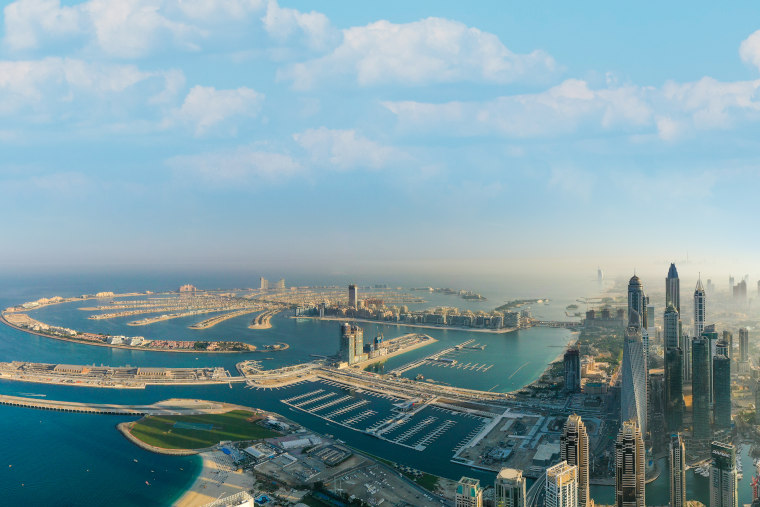 Image source: Captured Blinks / shutterstock.com
Image source: Captured Blinks / shutterstock.com
There is another promising stimulation method that could replace aviation: scientists induced artificial rain in Dubai using drones that direct electrical charges into clouds, causing droplets to stick together. This method prevents premature evaporation of large drops, which ultimately reach land due to their size.
The method is based on a system of ground generators that shoot salt into clouds. Such installations can be found near the city of Al Fujairah and Jebel Hafeet mountain.
Currently, NCM has tested a new method involving nanotechnology. Salt crystals encased in titanium dioxide nanoparticles are directed towards clouds to compress raindrops, thereby triggering precipitation.
Studies show that cloud seeding can increase precipitation by 10–15%, however, this method has its drawbacks. The penetration of silver iodide into clouds may prove toxic to marine flora and fauna.
A 2016 study discovered risks of increased soil and water toxicity levels from cloud seeding. Furthermore, there is a possibility that the technologies used to induce rain might “steal” it from other locations where this rain should have fallen. This could create an imbalance in the climate system.
We cannot always influence nature to the desired extent, and our actions can sometimes lead to unpredictable consequences.
Too much precipitation in a certain area will significantly disrupt the established functioning order of existing systems and may even lead to the extinction of certain plant species or animal populations. Therefore, artificially created rain is only justified in situations of genuine extreme necessity.
Scientists believe such weather experiments will inevitably affect the cyclonic activity of the United Arab Emirates, changing the existing precipitation pattern. Theoretically, atmospheric circulation could be transformed. For example, temperature contrasts might increase or sea breezes could intensify.
The Arabian Peninsula — one of the hottest regions on the planet — is characterised by an arid climate. Tropical areas of the peninsula rarely receive rainfall, with average annual figures barely reaching 100 mm.
However, in April 2024, the Emirates were hit by uncharacteristically heavy rains. Dubai's territory was particularly severely affected. Oman, Bahrain, and some areas of Qatar were also flooded. According to Al Jazeera television reports, 18 residents of Oman died.
Dubai received its typical two-year rainfall amount within 24 hours. The region's main airport operations were paralysed — hundreds of flights were cancelled and delayed, and passenger check-in for various airlines' flights was suspended for more than 24 hours.
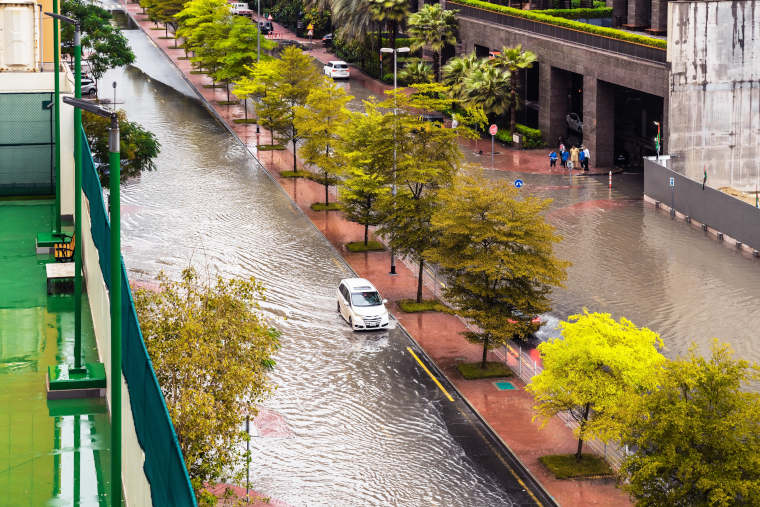 Image source: ad-foto / shutterstock.com
Image source: ad-foto / shutterstock.com
The internet contains numerous photographs and video materials showing the consequences of this weather collapse. Lightning struck skyscrapers, and pipes burst in the largest shopping centre, Dubai Mall. It was closed, as were most beaches and parks.
The sudden flooding became a serious challenge for the United Arab Emirates, whose infrastructure was not prepared to face such natural disasters. Drivers abandoned their cars in the middle of roads that resembled rivers, while some had to spend the night in vehicles completely stuck in traffic on highways.
Streets were flooded, metro operations were partially suspended, and huge shopping centres were also flooded, unable to cope with the downpour. Skyscraper lifts stopped working, forcing residents to climb dozens of flights of stairs on foot.
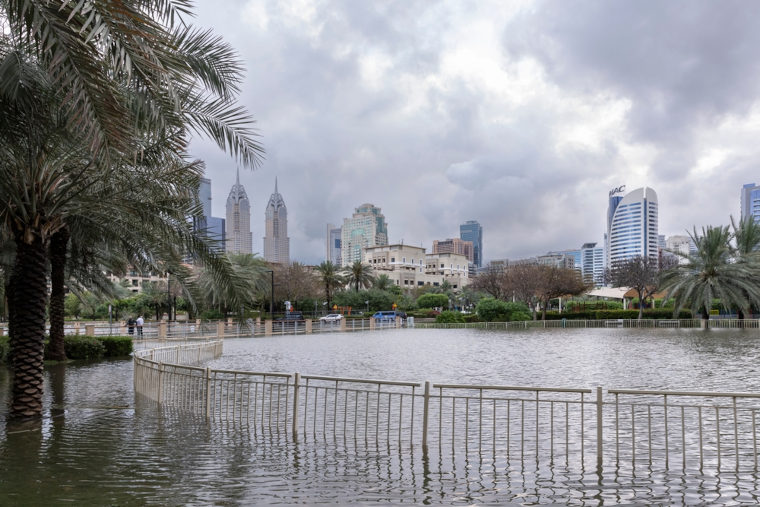 Image source: Katiekk / shutterstock.com
Image source: Katiekk / shutterstock.com
During the emergency, Dubai's government decided to extend remote working for employees, and schools continued the educational process remotely as well. The private sector also switched enterprise workers to remote work.
Like Dubai, other countries also induce rain artificially. There are several compelling reasons for this: cloud seeding can increase water supply, enhance rainfall for agriculture, reduce hail damage, or disperse fog.
Artificial rains have been practiced there for decades. The technology is most commonly used in Colorado, Texas, and California, as these regions frequently suffer from drought. Major ski resorts seed clouds to induce snowfall.
In the 1970s, the technology was used to stimulate snow precipitation for hydroelectric power stations, but heavy snowfall triggered a series of landslides and street collapses.
Possesses one of the largest cloud dispersal systems, which was actively used in Beijing during the 2008 Olympic Games to clear the skies and create optimal weather conditions for sporting events.
The country is actively expanding its existing weather modification programmes, and by 2025 plans to increase the coverage of controlled territories to an area that will exceed the size of India.
However, it is known that such experiments can lead to unpleasant consequences: 313 silver iodide projectiles released over Beijing during the February 2009 drought led to a serious snowfall, resulting in paralysed traffic on 12 highways near the capital.
Weather manipulation experiments were conducted to improve hydroelectric power station efficiency and support agriculture. Territorially, this includes New South Wales and Tasmania.
Spain and France conduct cloud seeding in mountainous areas to expand water reserves and help ski resorts create optimal operating conditions.
Russian meteorologists work with this technology in the southern part of the country to avoid destructive hail precipitation, as well as in the country's capital, usually for cloud dispersal (stimulating precipitation before clouds reach the city).
According to information provided by the country's National Centre of Meteorology, the possibility of rainfall increases significantly: by 30% in clean atmosphere and by 15% in dusty conditions. These figures are not final, as scientists are still researching this topic. With technological advancement, cloud seeding efficiency is expected to increase.
Precipitation can only be triggered where clouds are present. To initiate the process, water droplets in the cloud space must begin transforming into ice crystals. This effect is achieved either through intense cooling or by spraying crystallisation nuclei onto them. The latter is easier to accomplish.
After weather control technologies are applied, it can be difficult to predict the intensity of induced precipitation. For example, after an extremely heavy seeded downpour, the world's largest shopping centre, Dubai Mall, was flooded. The accompanying hail caused extensive damage, and transport infrastructure suffered serious losses.
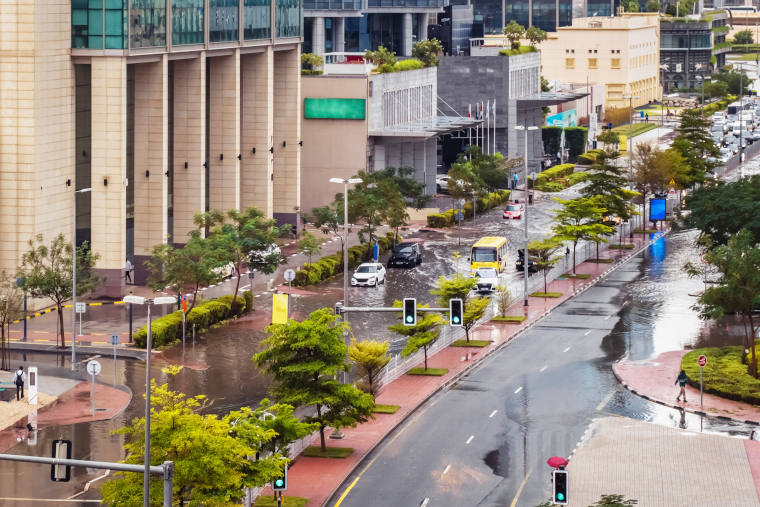 Image source: ad-foto / shutterstock.com
Image source: ad-foto / shutterstock.com
Is artificial rain in Dubai a whim or a necessity? More likely the latter, as the country's climate is extremely arid, and survival would be difficult here without precipitation stimulation technology. Modern technologies help maintain optimal rainfall levels.
According to experts, such weather “adjustment” can make the region more attractive for living and, consequently, for potential investors. Thus, improving Dubai's climatic comfort conditions could increase property values by more than 30–40%.
Article header image source: Naufal MQ / shutterstock.com